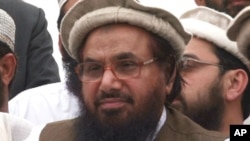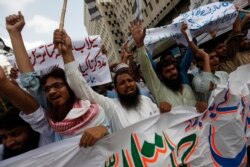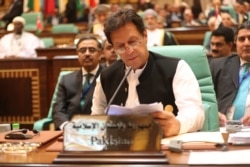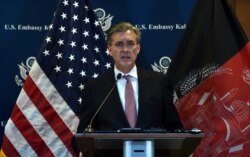Pakistani counterterrorism officials have registered 23 cases related to terrorism financing against more than a dozen people, including Hafiz Saeed, a central figure in the Mumbai attacks of 2008 that killed more than 170 people.
Counter Terror Department (CTD) Punjab said in a statement the individuals were using various charities and trusts to raise funds to finance terrorism.
Saeed and the other individuals are said to be from the leadership of Lashkar-e-Taiba (LeT), Jamat-ud-Dawa (JuD) and Falah-e-Insaniat Foundation (FIF), which are all organizations banned by the U.N. The U.N. sanctions committee considers the three groups, founded by Saeed, to be aliases of one another, with the latter two formed to bypass a ban Pakistan imposed on LeT in 2002.
Saeed has been sanctioned by both the United Nations and the U.S. for his role in the Mumbai attacks.
The crackdown is seen as a response to the pressure the country is facing from the Financial Action Task Force (FATF), an international terrorism financing watchdog that last year placed Pakistan on its “gray list” of countries. Such countries, the FATF warns, lack adequate controls over money laundering and terrorism.
FATF warning
After its latest review in May, the group issued a stern warning to the country.
“The FATF expresses concern that not only did Pakistan fail to complete its action plan items with January deadlines, it also failed to complete its action plan items due May 2019. The FATF strongly urges Pakistan to swiftly complete its action plan by October 2019, when the last set of action plan items are set to expire,” said a statement published on the FATF website.
The consequences of inaction could be a continuation on the gray list or a downgrade to what is known as the “black list.”
The lists are akin to a credit rating system, warning international banks and investors to be wary of a country’s compliance with international terror financing laws. Placement on the lists can add to the cost of doing business internationally, and could hamper the growth of Pakistan’s already faltering economy.
The country has recently negotiated a three-year, $6 billion loan package from the International Monetary Fund to help it get through a balance-of-payments crisis that sent its currency plummeting to historic lows last week.
During negotiations, IMF demanded action on “anti-money laundering and combating the financing of terrorism efforts,” according to a statement by Ernesto Ramirez Rigo, who led an IMF mission to the country in April and May.
The move against Saeed and LeT, a long-standing demand of the United States, is also considered to be timed to help a visit of Pakistani Prime Minister Imran Khan to Washington, expected later this month.
“When Imran Khan goes to the U.S., the first request they will make is for the U.S. to lift restrictions on giving money to Pakistan. ... So obviously they would want to take a performance report with them,” said Ayesha Siddiqa, author of two books on Pakistan’s military who also writes extensively on militancy in Pakistan.
Last year, the U.S. suspended more than $1.6 billion in security assistance to Pakistan, over its perceived inaction against militant groups, including those fighting U.S. forces in Afghanistan.
Despite the economic and other considerations, the Pakistani government faces an uphill battle in trying to convince the international community of its counterterrorism intentions.
“The U.S. will be heartened by this move, but it will want Pakistan to go further and take what it often describes as ‘irreversible’ steps — efforts that don’t just register cases against these terror groups but also dismantle their financial networks entirely,” said Michael Kugelman, deputy director of the Asia Program at the Wilson Center, a Washington-based think tank.
‘Devil is in the details’
Richard Olson, a former U.S. ambassador to Pakistan, agreed that it would be regarded as a positive step initially but said, “The devil is in the details. Much will depend on how vigorously the prosecution is pursued.”
The doubts stem from past Pakistani actions, Siddiqa said.
“The reason why people doubt them is that they have taken such actions in the past under pressure [from the international community] but reversed them as soon as the pressure was off,” she said.
Amjad Shoaib, a retired lieutenant general of the Pakistan army who now appears as an analyst on local media, said Pakistan was expected to take action without evidence.
“Neither India nor the U.S. has ever given concrete proof against Hafiz Saeed that could lead to conviction. Then they expect us to take action against him. How can we do it?” he asked.
Pakistan’s courts have, in the past, dismissed cases against Saeed for lack of evidence. The U.S. government has offered a bounty of $10 million for information leading to his conviction.
Registering cases against Saeed or such individuals was only one part of the equation, said Amir Rana, the director of Pak Institute for Peace Studies, an Islamabad-based think tank. The other part of the equation, a comprehensive plan on what to do with the mindset that led to militancy, was missing.
“What we need to see is what to do with these people. Even if JuD disappears, the mindset will continue. There are other groups that its members can join,” he said.







